Shanghai Journal
A month of research, scallion noodles, and plane trees
“I want to be a housewife,” so Jing tells me over shrimp and mushroom changfen and choy sum—Chinese flowering cabbage, the green burning so bright and beautiful that it looks almost radioactively healthy but for the sweet sauce bathing it. It’s just about the best dim sum I’ve ever had. Fanlou, the name of the restaurant, rivals even Chicago’s Minghin Cuisine, a Cantonese food mecca in the Midwest as well as my very favorite restaurant which I take friends to whenever they—well, we, as I’m almost never in my hometown, if you can even call it that as I’m a suburbanite—are in town.
This Jing of supposed housewiferly intentions is the same Jing who has just started a healthcare company, her first business. She’s been running around Shanghai the past few days getting the company off the ground, officially naming it, formally signing papers, and brainstorming what its focus will be. Will it be like the Chinese version of Better Help, connecting patients with providers? Will it be more healthcare management focused? Jing’s not sure. This, in addition to the breast cancer oral history project we’re both working on. This, in addition to her other global health research project on migrant populations in China. This, in addition to how she’s a practicing psychologist at a Shanghai hospital.
“I don’t believe you,” I say, laughing. “You just started a healthcare company. You wouldn’t be happy.”
No, Jing explains. Her definition of being a housewife is being primarily at home; she also means that she’s okay with not making a huge salary as long as she’s doing something interesting with her time. She means not being the breadwinner, I think. She tried being a “housewife” during the pandemic in China, while searching for her first job after graduating from her master’s in counseling—her long-term boyfriend had a steady job at the time. She didn’t like being at home without anything keeping her busy. Thank god when she got the internship at the hospital and started seeing patients.
“See? That’s what I thought!” I say, all but swallowing a shrimp dumpling, a xia jiao, and wonder why the steamers invariably contain a mere four dumplings (“dumps” as some of my friends humorously refer to them) when they should contain at least twenty.
Jing isn’t originally from Shanghai, but she sparkles of the city’s curious-about-everything spirit and embodies confidence and female power. She insists on using English to speak to me, a move that, depending on the person, may at times ring of political leanings and identification with the West. At some point she stopped using Chinese on her WeChat Moments page and switched to English as well. Languages can be like that, I think: steeped in abstraction and governments and specific memories, far away from their intended usage of straightforwardly conveying representations of concepts and objects, like the Platonic world of forms but it’s words and characters that are the falsities, the facsimiles of the real things, rather than the objects themselves.
It’s this spunk, this drive, that makes me look up to her. Two years my senior, Jing seems to me vastly more worldly and sure of her path in life. “You’re already working and seeing patients,” I say to her, longingly, more than a few times over the course of July. In contrast to myself, the seemingly perpetual student. She’s settled into this city of dreams—two adults, two cats—and I am still finding my way on this Earth.
This month is the last in sequence of my Journey to the East, my residence permit expiration date hanging over my head to such a degree that I open my passport multiple times per week to check that no! I haven’t gotten the date wrong and accidently overstayed my welcome and gotten slammed with an impromptu exit ban, and that police officers or, Shangdi-forbid, the inner circle of Party leadership itself, isn’t coming to knock on the door of the professorial apartment I’ve gotten permission to stay in.
I’m here principally to participate in an oral history research project on breast cancer survivors in Shanghai based in NYU Shanghai’s Center for Global Health Equity. Thanks to Kathy forwarding the job advertisement to my WeChat, I cold-emailed the professor in charge of the project and asked if I could join, despite not being an NYUSH student. She said yes.
Our initial goal is to interview fifteen breast cancer survivors and fifteen of their caretakers in a 1:1 ratio, but although we easily make the target number of survivors, we find it difficult to land caretaker interviews. Either the survivors themselves do not feel willing to bring up the project to their spouses or parents, citing reasons ranging from work to privacy, or the survivors care for themselves, going to the hospitals alone for treatments and returning home alone by taxi, or they have no significant other or family remaining and are helped by a worker they hire. The majority of those we interview speak positively, optimistically, or neutrally about their experiences, rarely delving into moments of pain, anger, or difficulty. Some “jiang daoli,” and choose to speak of their experiences indirectly by referring to historical figures or Buddhist teachings. But there are a few who do openly share more negative emotions with us; one survivor tells us she thinks everyone else who doesn’t talk about the negatives is lying, putting up a facade. We may never know. I get a sense of profound loneliness from all of them, whether or not they actually feel unhappy or lonely themselves; it’s hard hearing people say that because of the way their bodies have changed, they don’t think they’re eligible to see others romantically, or that they can no longer use their arms properly due to lymph node removal, or that they go alone to the hospitals.
It’s interesting going to Shanghai East Hospital to do some of the interviews and recruit survivors; the doctors give us access to their office and give us numbers of potential patients, and the professor and NYUSH students and I call different numbers at the same time. But just as quickly as the room privileges are given, they are taken away: there is mention of a scandal, a chouwen, unrelated to our project, and we lose access to the unique 12th floor room within the breast department.
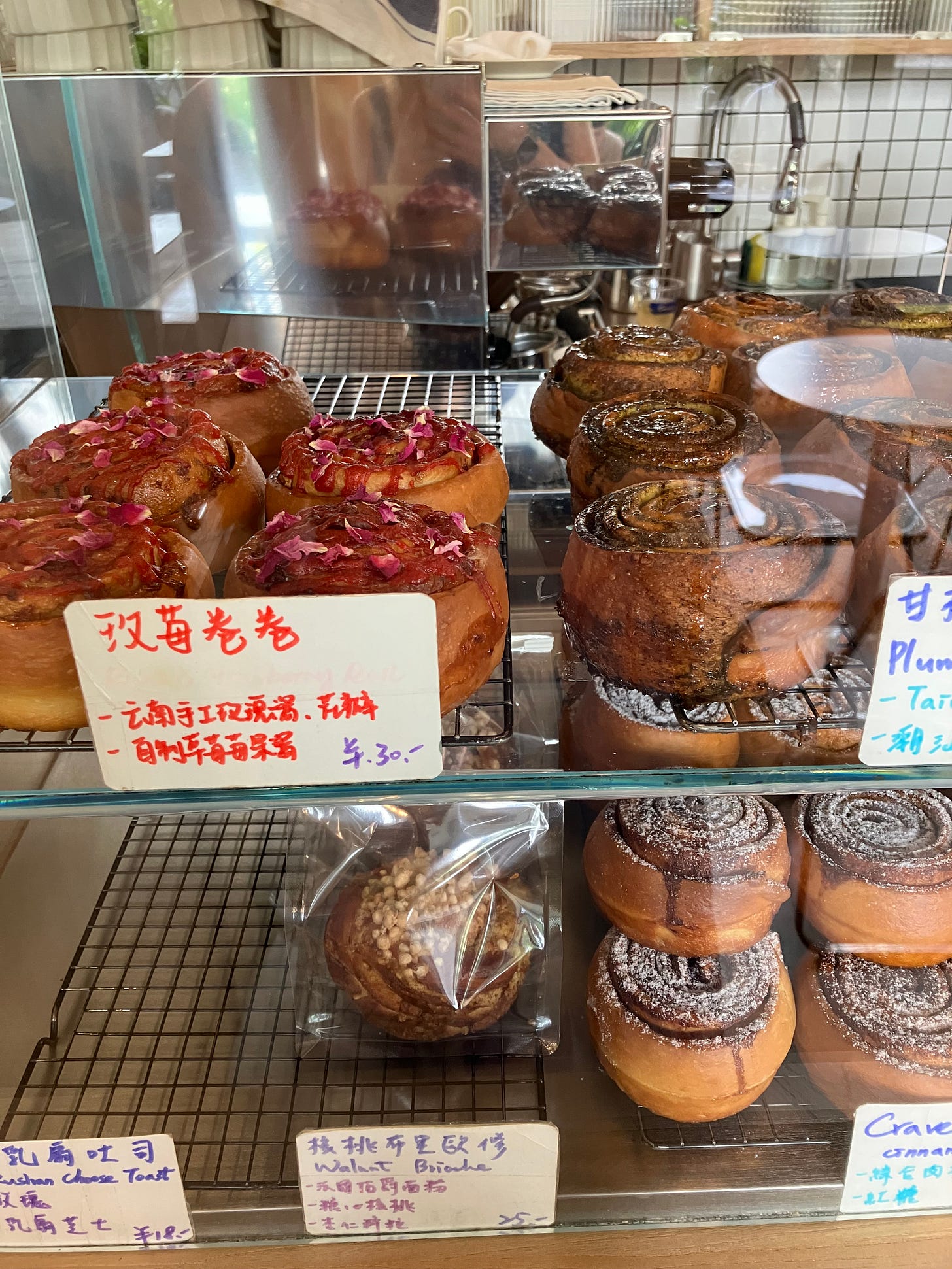
In my free time, I go cafe-galavanting and noodle-hunting, but it’s the noodles themselves that end up wrangling me. I get caught up in a scallion noodle-obsession and become a regular at the 10 kuai Huxi Laonongtang Noodle Shop (4.2 stars on Dianping, China’s Yelp), the noodles served in blue and white porcelain—always heaped with crispy fried scallions and studded with miniature shrimp—in a dimly lit three-story portion of random skyscraper. I discover cafes with unique Chinese flavor takes on cinnamon rolls and berliners, taking my Chinese notebook with me wherever I go so I can write down new food vocab words like lemongrass (shuweicao) and so that I can finally force myself to remember the tones on crab meat (xiefen, 4 and then 3). It reminds me of how when I first came to PKU, I would take pictures of all the yellow signs hanging above the different dishes at the canteens on campus—there were so many food-related characters that I’d never seen before—so as to commit them all to memory and dictionary them all and not have to just say “wo yao yi ge zhege, zai lai yi ge nage,” “I want one of this and one of that.”
Each day I run a full lap around Shanghai’s Century Park (4 miles), dragging a full 360 degrees of my body through 37 degrees Celsius (98.6°F) of Shanghai heat. I confront the inevitability of a Beijing bikini’d shushu on bicycle passing me each time, pedaling weakly the other way, yelling, “ZHEME RE DE YI TIAN, hai you ren zai PAO BU ne!” (“How are there people RUNNING in THIS HEAT?”). I chortle and flash what I hope to be a winning, pearly smile at the shushu, but what is most likely a pained ’n’ coffee-stained expression of a red-faced young waiguoren dripping with sweat, counting down the minutes and miles and seconds and feet until I can be DONE with this run. Long after the shushu has passed me by on bicycle and I am left to my sweaty lonesome, my crop-topped self continues to contemplate both the mental image of the shushu, wife-beater up and paunch out, as well as the question, are Beijing bikinis themselves not also a form of crop top? And, by the same token, am I not also an early iteration of a shushu? A vestigial form of shushu, like the leg bones hidden deep within whales? Shushu inculcation by osmosis. The cycle begins early, preys on the young.
Shanghai is filled with color and lush with leafy vegetation and human life; Emma is right. I see why she loves it, why anyone would love it. It’s not just the Bund—reminding me so intensely of Chicago’s old-new blended Michigan Avenue and waterfront—or the French Concession and the Wukang Mansion or Yuyuan Gardens. It’s the hutong-esque, shoebox-small shops near Jing’an Temple if you walk a bit deeper, past the famous neon-signed Renhe Guan restaurant or onto the nearby Fumin Road. It’s the art museum, shaped like an ancient pottery vessel. It’s the names of all the streets: they’re all names of Chinese cities and provinces, kind of like in D.C. It’s the scent of scallion oil and crab meat and ginger-spiced vinegar, the weight of rain in the air. It’s the sound of Shanghainese, everywhere and all the time, but especially in the little old-style snack shops like where Emma took us to buy juhonggao, those orange mochi candies. It’s the tiny square near the American Consulate by South Urumqi Road with the statue of the famous composer where the old people dance at night (okay, old people dance in any space larger than 100 square meters). It’s the black sesame ice cream and the lighthearted names of popular bakeries: “Drunk Baker,” for one. The fusion cuisine and xiaojiuguan. The signs of heritage architecture, the grey and orange buildings, the flakey camouflage plane trees—their name in Chinese, 悬铃木 xuanlingmu, means “tree on which to hang bells.” Bell-hanging trees. Chinese, at once timeless and beautiful in its ability to perfectly and concretely describe a life form; science words are all like this, rather than laced with Latin roots. The language that brings these trees to life also brings—brought—me to life.
The bell-hanging trees arch their short, verdant forms cavernously around all the curving roads, ad-hoc electrical wiring swinging between them like children on monkey bars. And I swing between them as well, though my swinging consists of feet solid and strong on concrete, wondering whether this, this month, this time in Shanghai, is what a home feels like.
Or, perhaps a month is but an interlude: the hanging bell-shaped space between homes.
Yours always,
Marianne
2024 year, 7 month, 28 day
Shanghai Pudong

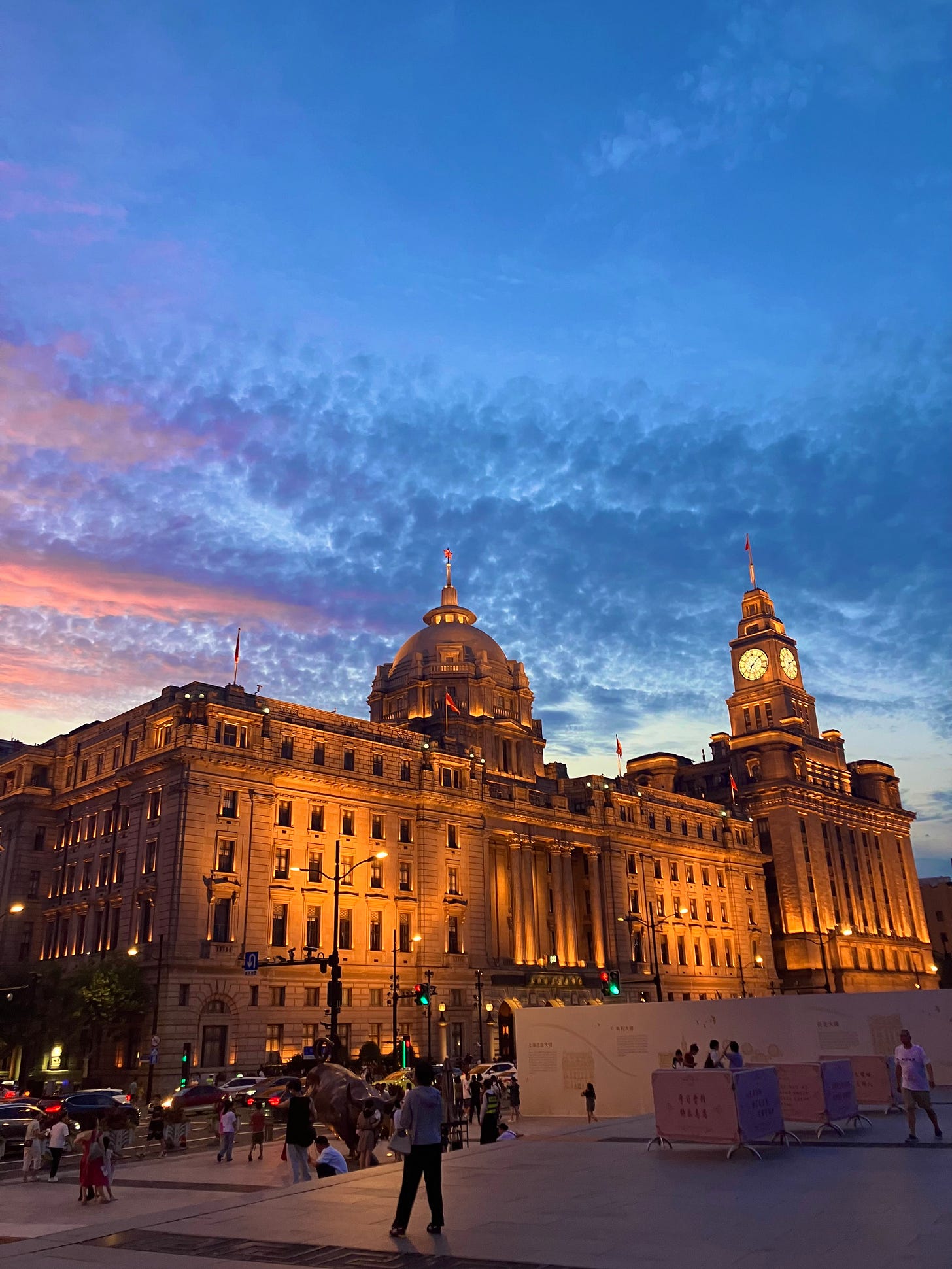
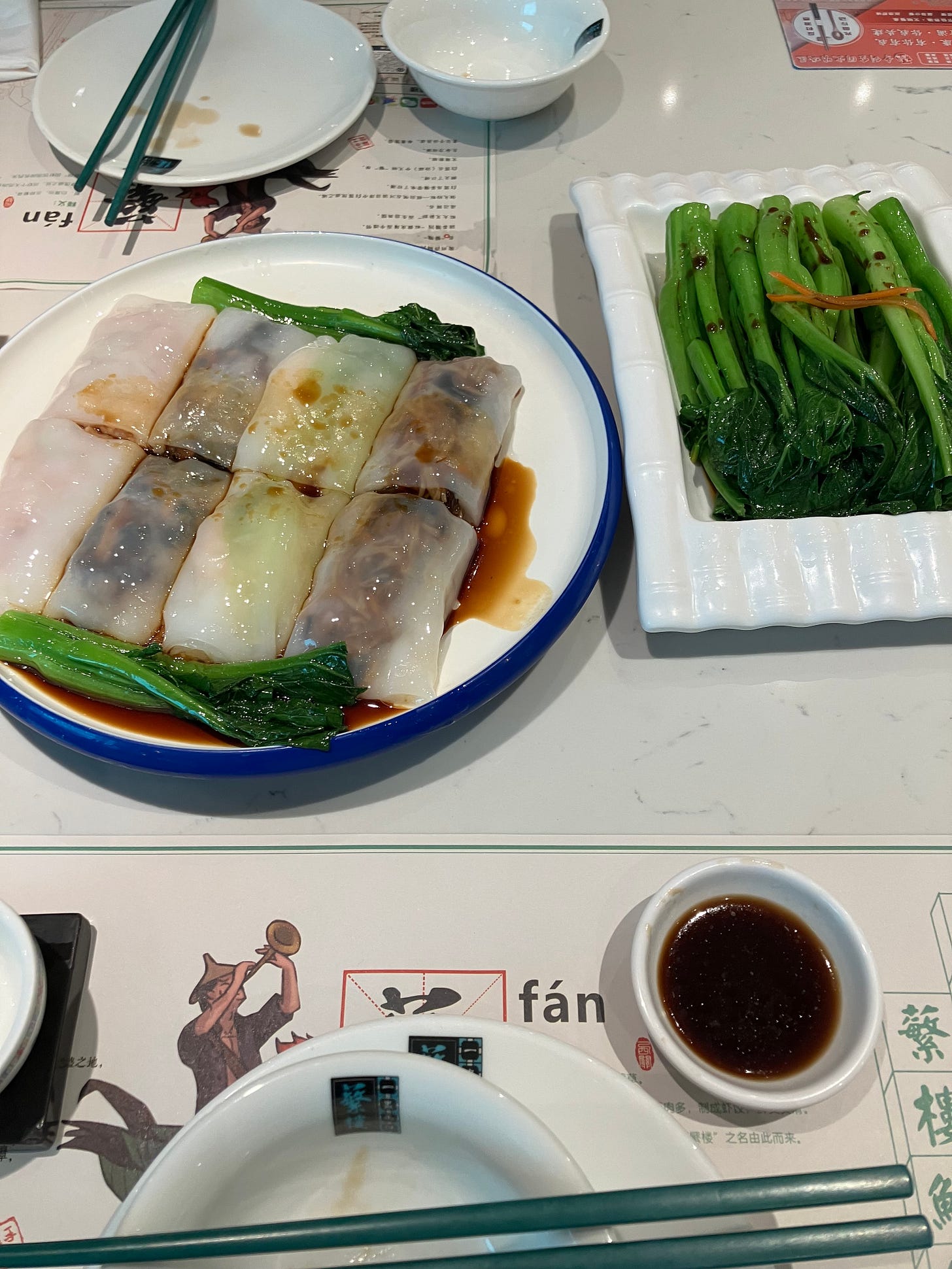
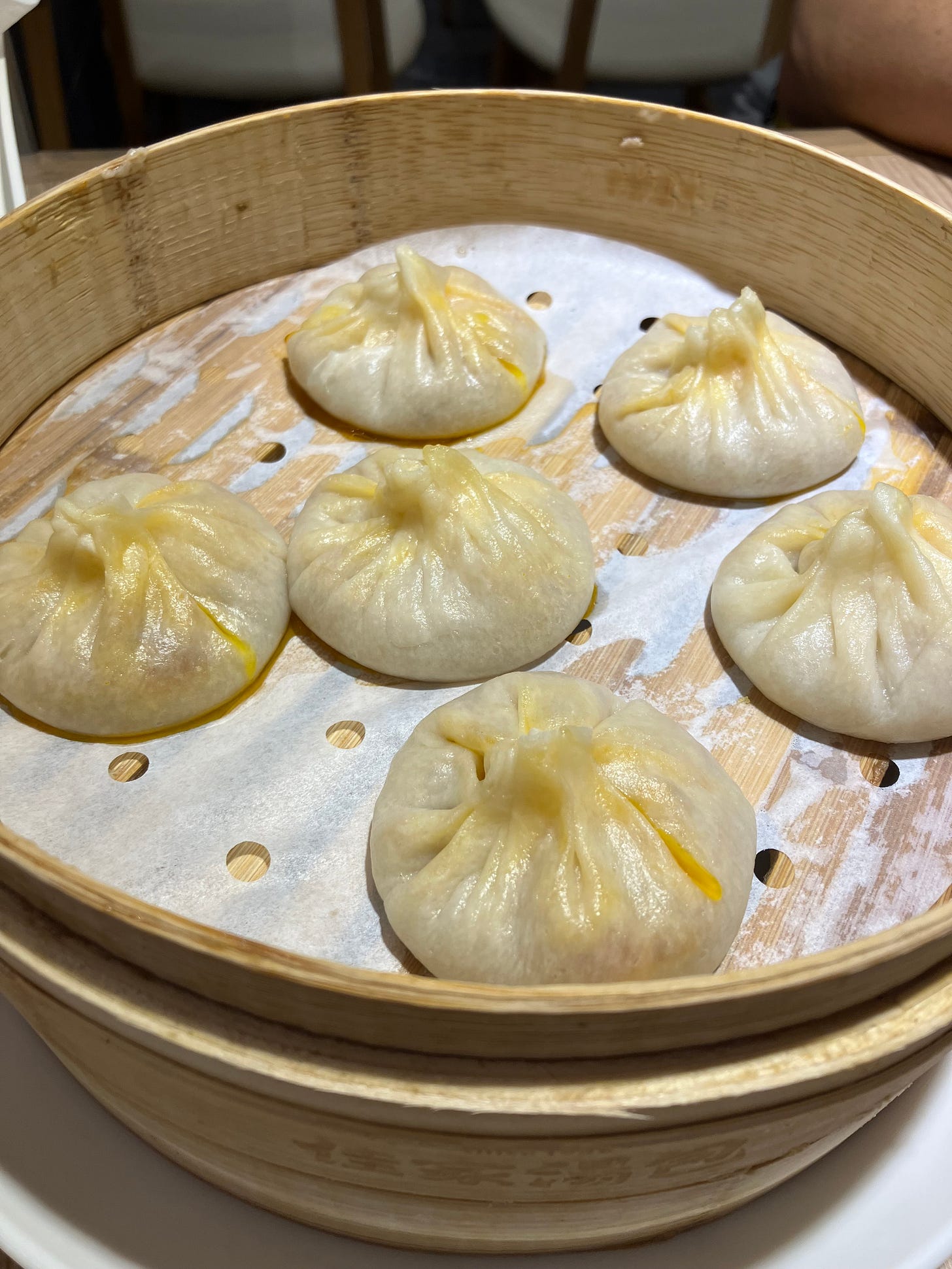
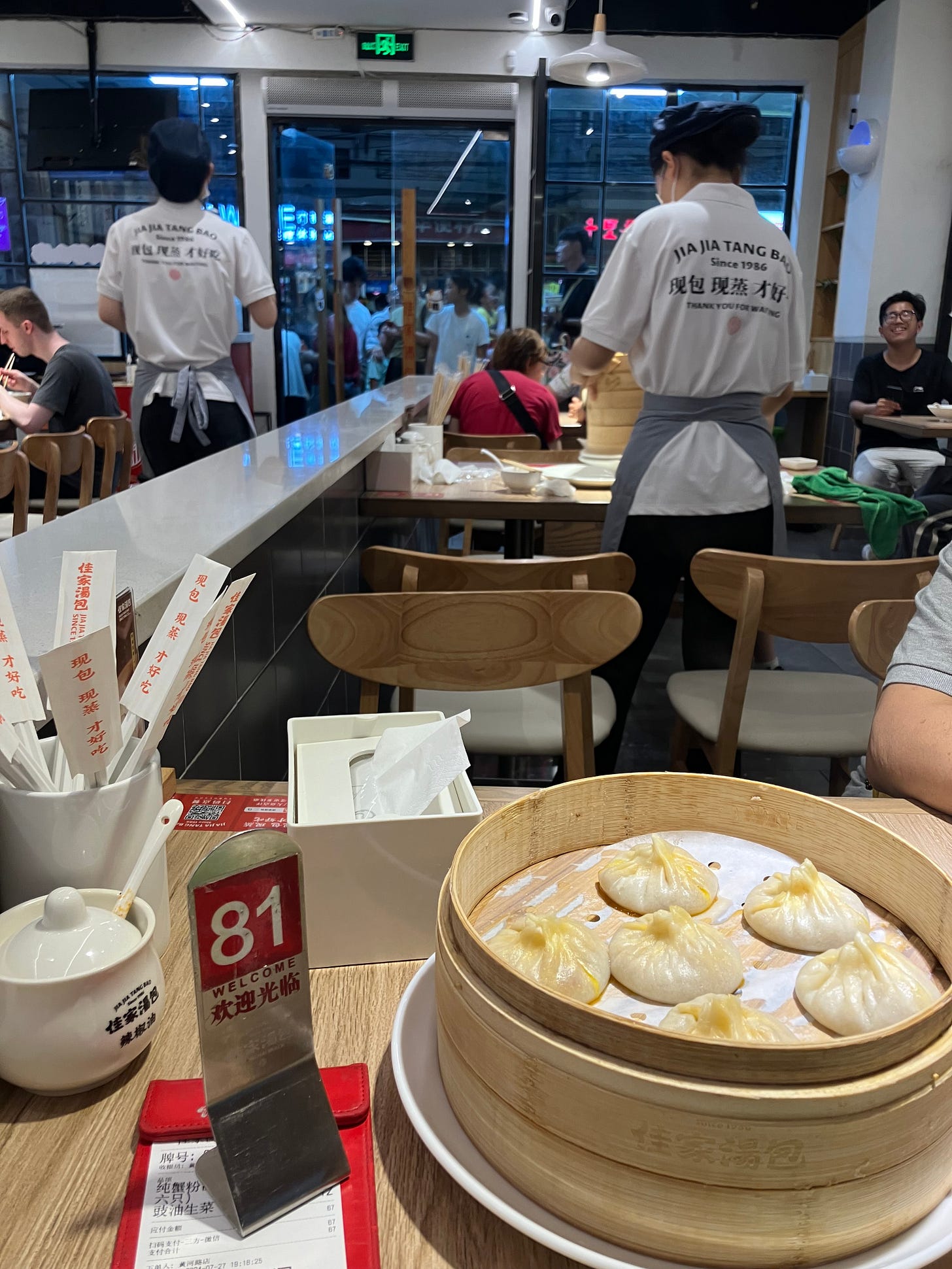

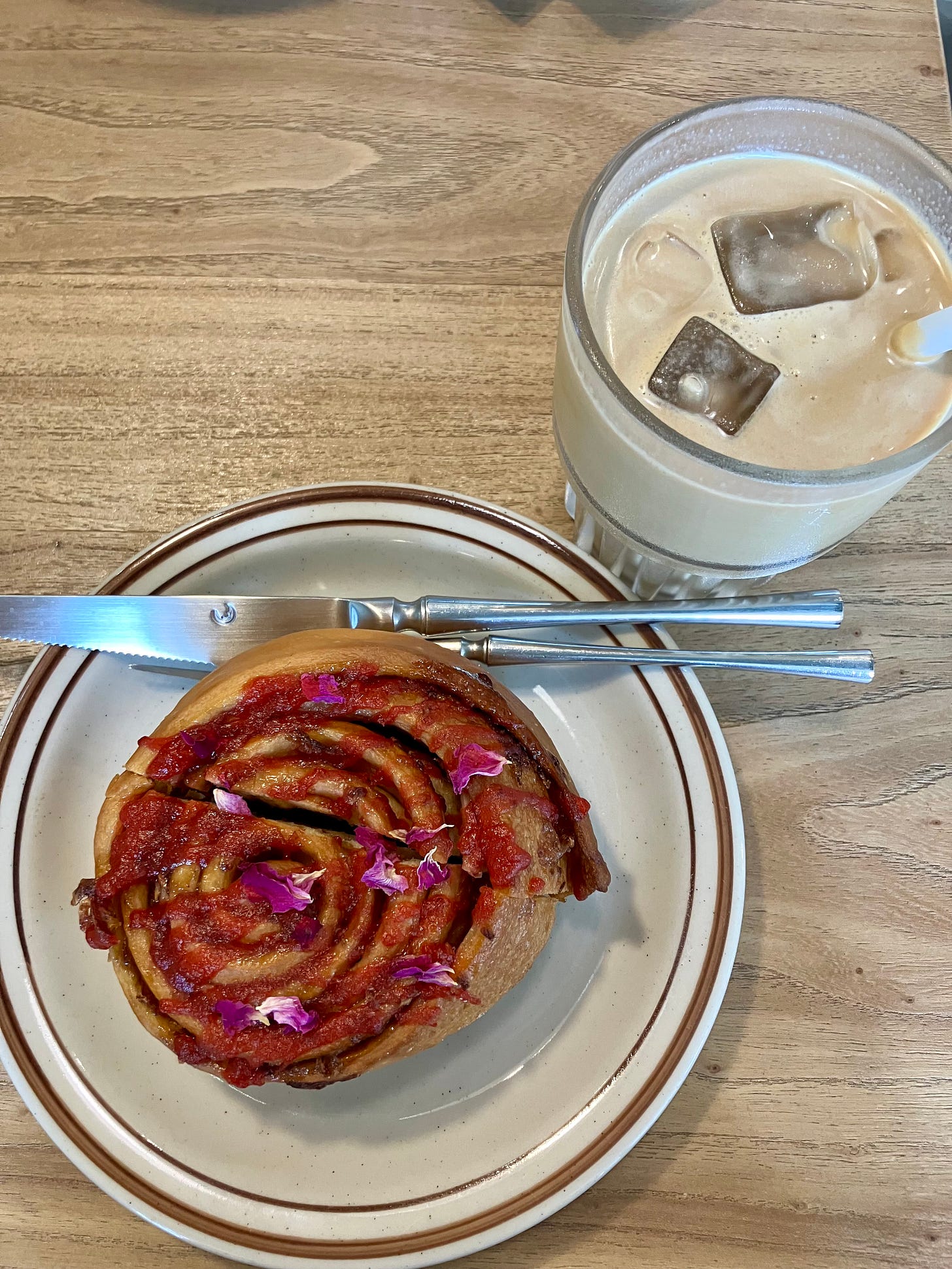
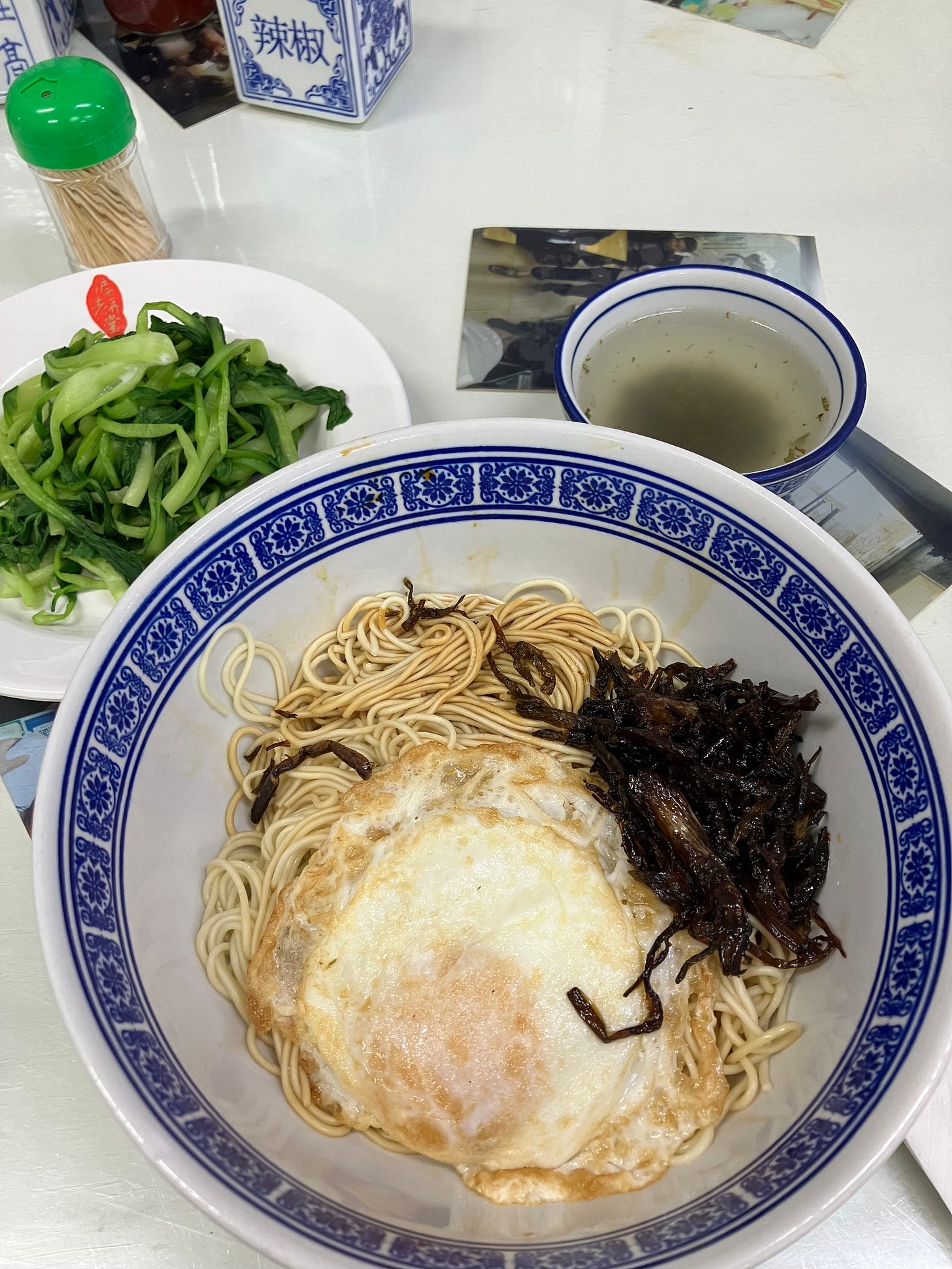
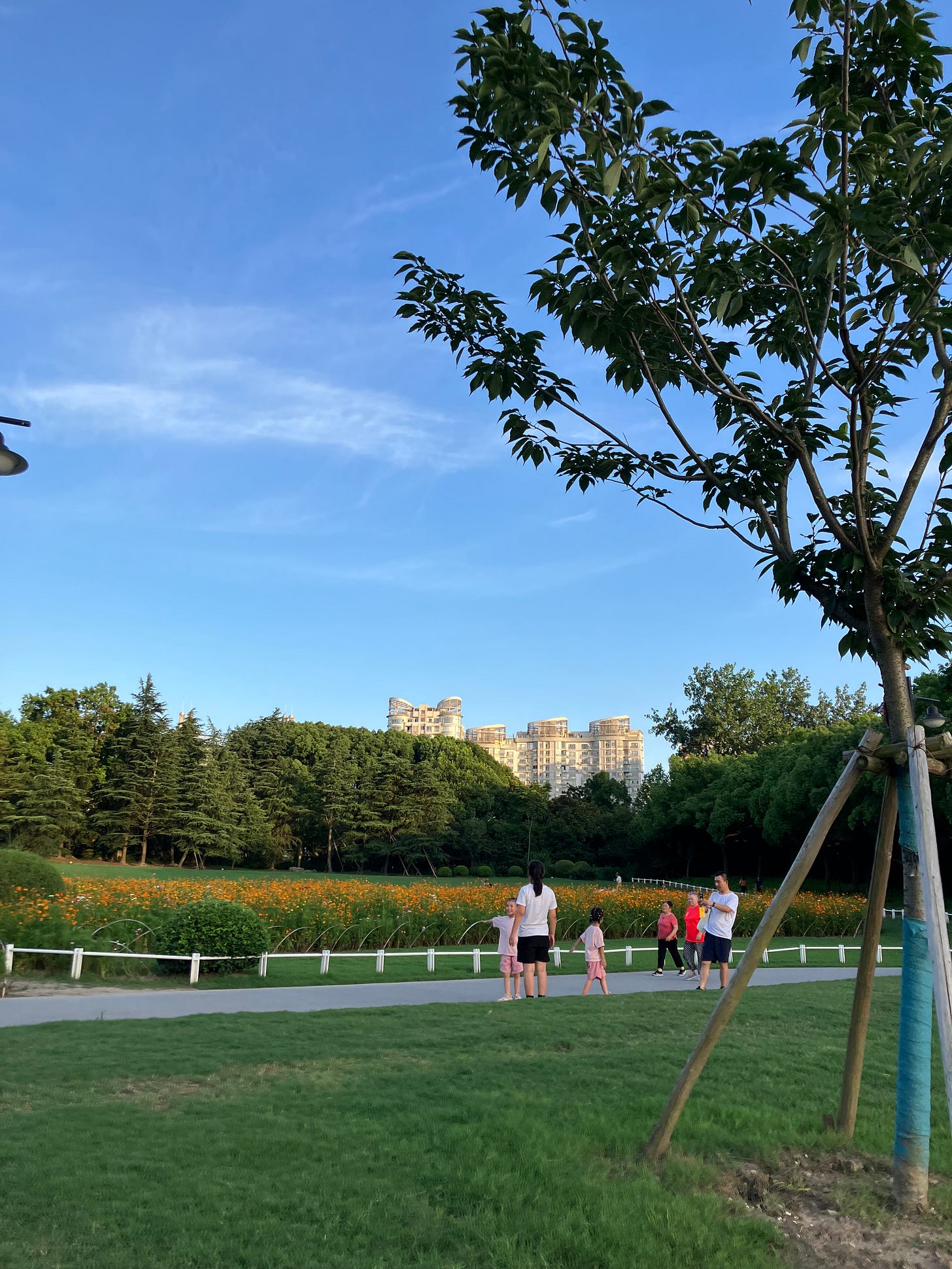
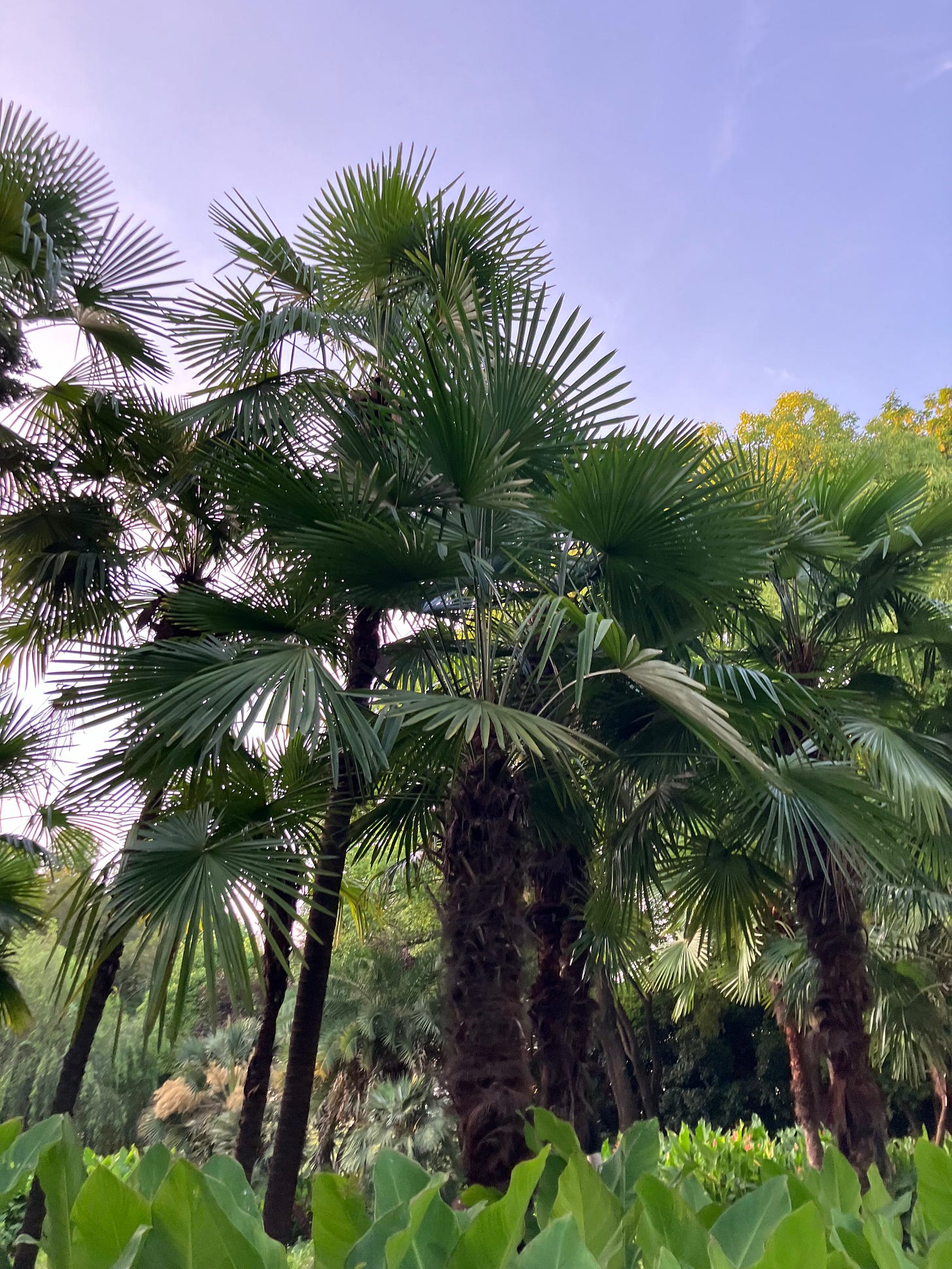
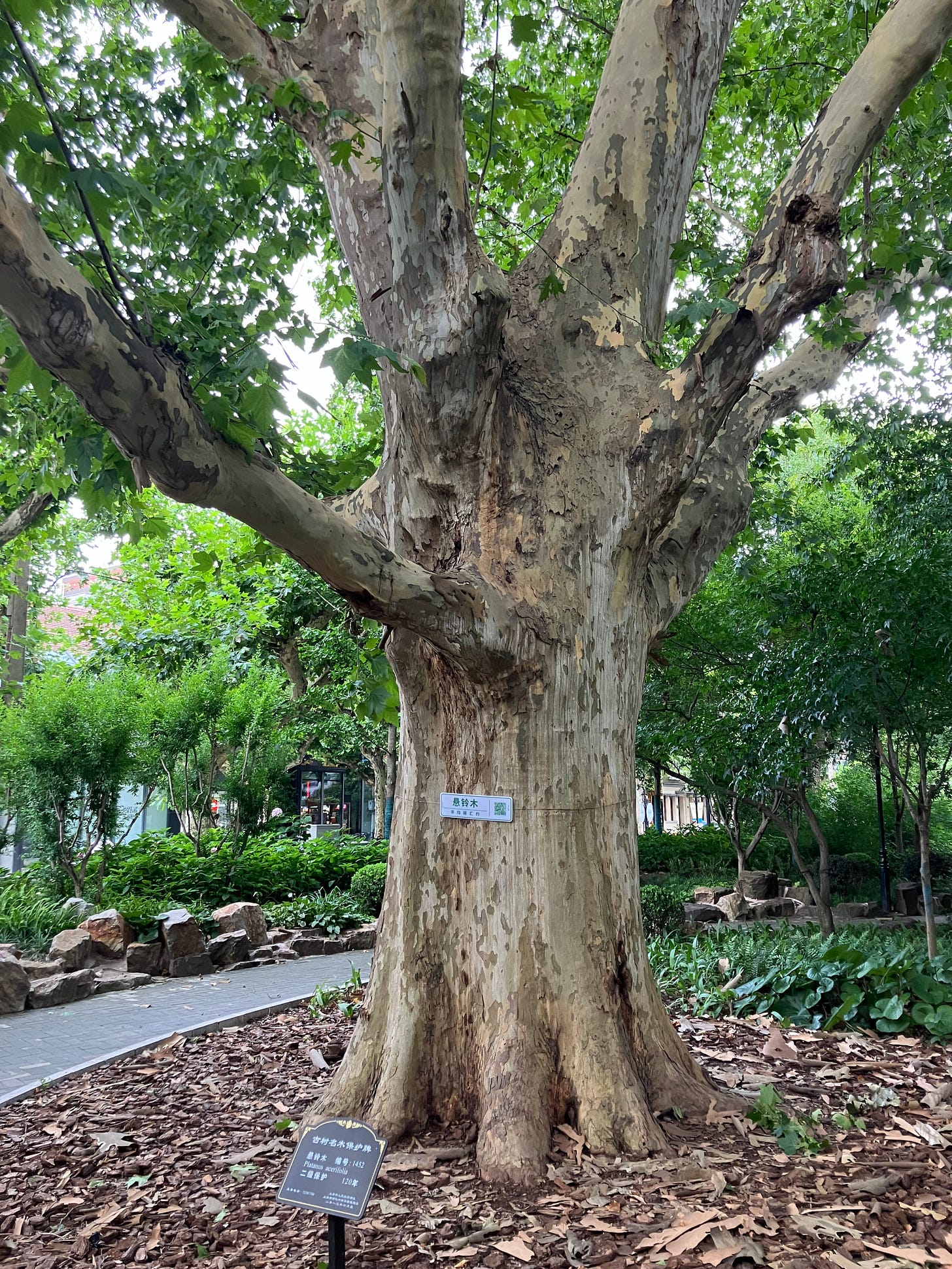
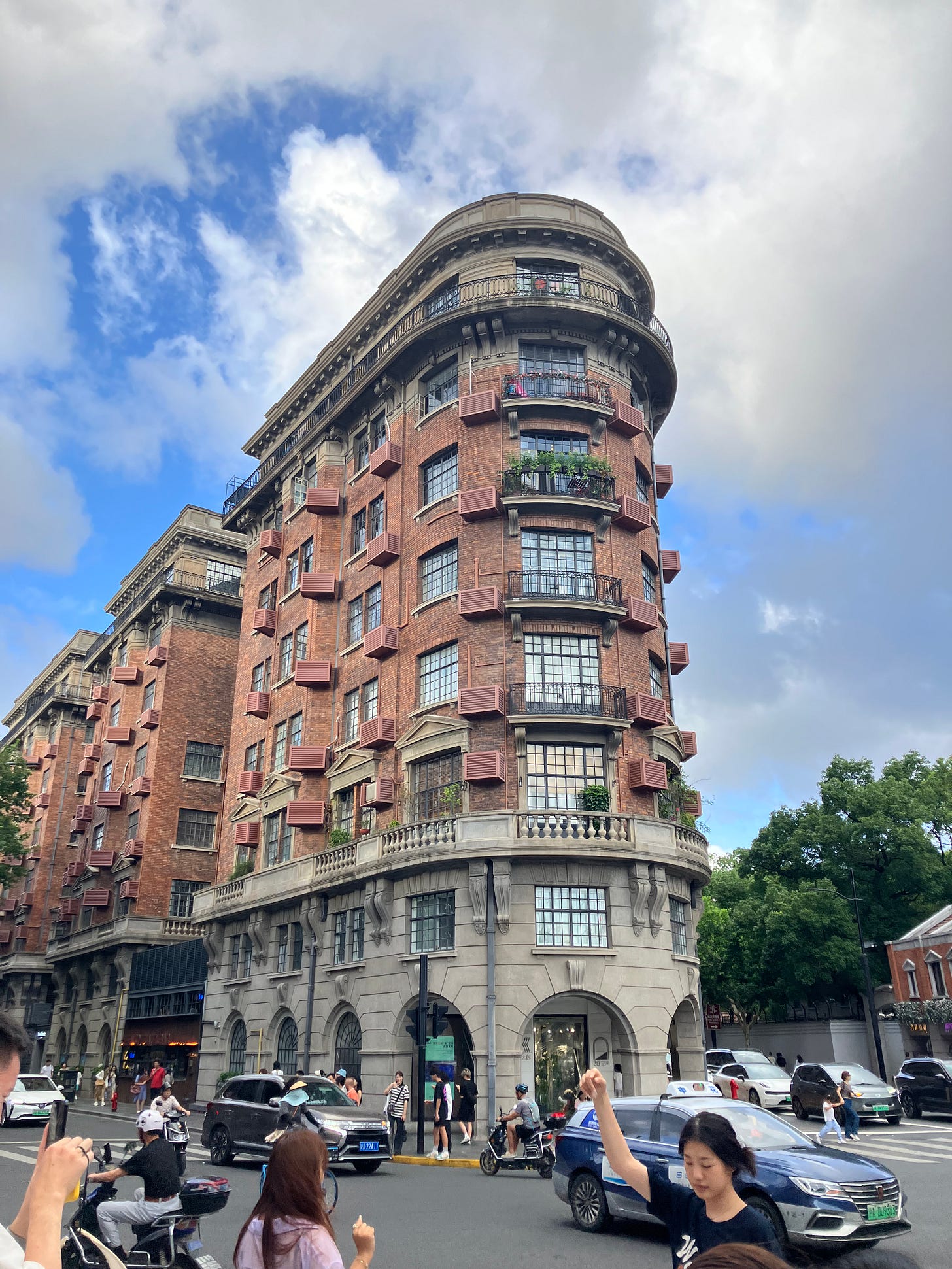
Just reading this now, Marianne, and I love it (beautiful as always)! I was actually just in Shanghai last month (ahhh I didn’t realize you were there) and your descriptions brought me back to it all (also, love the bit about you running and the shushu hehe… also respect for surviving the heat wow)!!
I am obsessed, bestie!